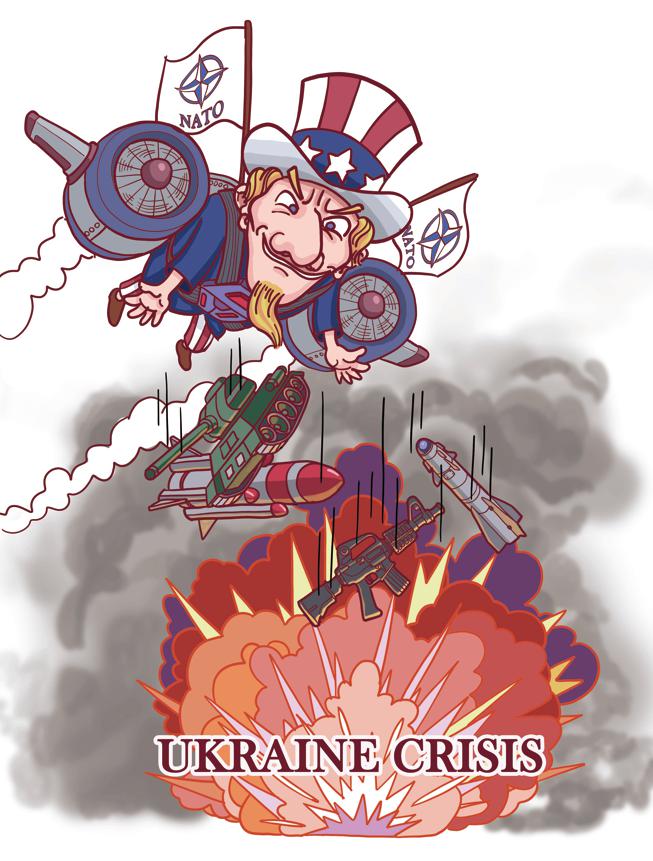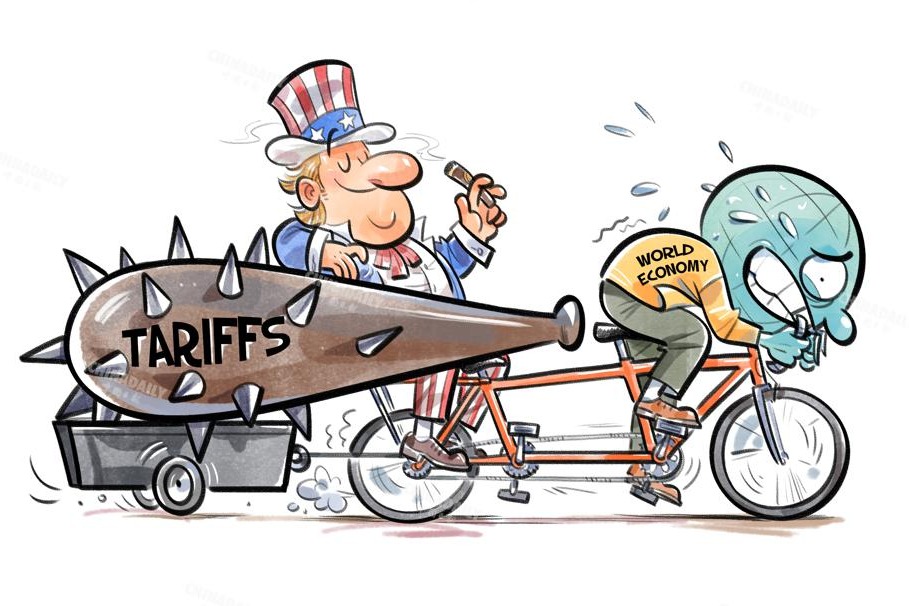Ukraine crisis puts Europe's autonomy at stake
By Ulf Sandmark | China Daily | Updated: 2022-05-13 07:27

The Western strategic mobilization in the wake of the intensifying Russia-Ukraine conflict has further limited the already shrinking autonomy of Europe. The massive military, media and political pressure has lined up European countries in a common sanction policy against Russia and a common weapons delivery policy for Ukraine.
A most dramatic shift could happen in the Nordic countries of Sweden and Finland if they join NATO, abandoning their policy of non-alignment which represents an important part of Europe's autonomy.
Catastrophic shift in non-alignment policy
In the case of Sweden, it would end a 200-year-old policy of neutrality. As for Finland, the country's policy since the end of World War II has slowly increased its autonomy, from the Friendship Pact with the Soviet Union developing into a bridgehead between the West and the East and promoting peace and development based on its nonaligned diplomatic stance and strong independent industrial development. Not to mention that the Baltic Sea was a region of low tensions even during the Cold War.
It has been a common understanding among coastal nations for most of the time to keep the Baltic Sea free of great power conflicts. This could come to an end if Sweden and Finland joined NATO and helped bring in US, British and other European military forces into this theatre, increasing the great power confrontations.
'Wolfowitz Doctrine' and US hegemony
NATO's expansion in Northern Europe stems from the United States' policy of global hegemony, which has been destabilizing the world and pushing it toward another world war. This policy of curtailing the autonomy of other countries is part of the "Wolfowitz Doctrine".Former US undersecretary of defense Paul Wolfowitz published the initial version of "Defense Planning Guidance" for the 1994-99 fiscal years on Feb 18, 1992, which came to be known as the Wolfowitz Doctrine.
"Our first objective is to prevent the re-emergence of a new rival, either on the territory of the former Soviet Union or elsewhere, that poses a threat on the order of that posed formerly by the Soviet Union. This is a dominant consideration underlying the new regional defense strategy and requires that we endeavor to prevent any hostile power from dominating a region whose resources would, under consolidated control, be sufficient to generate global power." This offensive imperialist formulation had to be revised into the final formulation from April 16 1992, but it still claimed global hegemony.
"The third goal is to preclude any hostile power from dominating a region critical to our interests, and also thereby to strengthen the barriers against the re-emergence of a global threat to the interests of the U.S. and our allies," it said.
If there ever was a clear answer to the question whether the US would fall into the Thucydides trap, this is it. The Wolfowitz Doctrine manifests itself in the doctrine of "rules based order" throwing out international law based on the United Nations Charter of equal rights of every nation for sovereignty and development. The Wolfowitz Doctrine is also seen in the US policy of endless wars which now risks becoming the fate of Northern Europe, too.
Finland is extremely close to Saint Petersburg and other major Russian cities. Finland's border in the north is only 180 kilometers from Murmansk city on the Kola Peninsula, where there are major bases for the strategic nuclear submarine force of the Russian Navy. Sweden is 450 km from Murmansk.
These submarines are continuously patrolling under the Arctic ice cap. NATO's expansion, by including Finland and/or Sweden as members, would threaten these Russian bases and endanger the major part of the Russian second strike capability and therefore disturb the global nuclear balance. As a result, a huge strategic crisis would engulf Northern Europe, like the Cuban missile crisis of 1962.
Already, in peacetime, Sweden as a "partner" to NATO has allowed the strategic B-52 bombers to fly across Sweden toward the Russian border. These flights are huge, insane nuclear provocations against Russia. This provocative policy should stop immediately. But it cannot be backtracked easily if Sweden joins NATO.
Facing a nuclear weapons crisis, the only option to ensure security is the policy for peace and common understanding, of which President Xi Jinping has been the most vocal proponent with his "Initiative for Global Security", but also with the Belt and Road Initiative for peaceful economic cooperation, the Global Development Initiative and other international initiatives for the common good of humankind.
In this context, the Schiller Institute has been getting increasing support to convene a "Conference to Establish a New Security and Development Architecture for All Nations".
Feverish drive to join NATO against Russia
The government of the Social Democratic Party of Sweden, in close cooperation with Finland and NATO member states, has put Sweden on a fast track to join NATO.The governments of both Sweden and Finland are in contact with NATO countries to ensure early security guarantees, "in case of an attack by Russia during the critical period of the application procedures" when all NATO member states are to make a decision of approval in their parliaments.
On Saturday, May 14th, the Social Democratic Party of Finland is expected to make a decision on joining NATO. On May 17-18, Finnish President Sauli Niinistö will visit Sweden, possibly to announce the common decision of the two countries to apply for NATO membership.
Even if Sweden decides not to join NATO, Finland is expected to do so. In the ongoing debate on NATO in Sweden, some leftist politicians have said this is not the first time the two countries would decide on different military policies. In 1940, during World War II, Finland allied with Nazi Germany, joined Operation Barbarossa to attack the Soviet Union and took part in the long siege of Leningrad (Saint Petersburg). That proved disastrous for Finland, for it had to agree to a separate costly peace treaty, when the war shifted.
Attempt to steamroll decision in Sweden
The domestic opposition to the Swedish government's attempt to join NATO is shaping up mainly because the Swedish people are shocked at the blatant methods used to push through a decision against their wishes. The procedure is like a coup d'etat, overriding the democratic processes for both the nation and the government. The ruling SDP of Sweden has sent out a questionnaire to party organizations and will have a board meeting of the party as early as Sunday, May 15th, to evaluate the answers and decide whether to join NATO, probably overriding the current Social Democrats' policy of non-alignment reaffirmed by their congress last year.
It would also override any debate in the national elections in Sweden scheduled for Sept 11. The one-party minority government also wanted to override the parliament by making the decision an exclusively government affair. The need for at least some parliamentary control was raised by even the pro-NATO nonsocialist opposition, which has ensured a debate on joining NATO takes place in the parliament.
Against this hurried process, Left Party leader Nooshi Dadgostar, in a national public radio interview on April 28, gave a clarion call for mobilizing support against Sweden joining NATO and demanded a national referendum. This turned the Left Party demonstrations on May 1 into a huge rallying point against NATO with a record 25,000 participants in Stockholm and huge turnouts in other cities.
Among the Social Democrats, a sporadic opposition was visible on May 1 when some SDP supporters held posters against joining NATO.The same morning a leading Social Democrat and minister in former prime minister Olaf Palme's government, Pierre Schori, together with Henrik Fritzon, the regional leader of the SDP in their more radical southernmost region, wrote an oped in Aftonbladet newspaper, urging SDP members to "Say No to NATO". They also stressed that the issue of nuclear weapons was not even mentioned in the questionnaire sent out to the members.
Sweden's bid to join NATO is faltering
In the week that followed, the internal control of the party leadership began to crack. The SDP's women's organization along with its leader, Minister of Environment Annika Strandhaell, has come out against Sweden's NATO membership. The SDP's youth organization, too, is opposing NATO. The first local party organization to oppose the NATO membership was the city of Trollhättan, which is part of the auto industrial cluster in western Sweden.
The SDP's women and youth organizations are crucial for the party to conduct any election campaign. If the SDP leadership sticks to its pro-NATO line, it will face a huge challenge from the Left Party. And despite its strong position in Sweden, the SDP could face a situation similar to Southern Europe where the Socialist parties have almost disappeared.
There is full mobilization from all Left organizations against NATO, and more demonstrations are being planned across Sweden against NATO membership. Some networks close to the right wing, populist Sweden Democrats are also planning demonstrations against NATO.
Opinions favoring NATO shrinking
Already, the support for NATO membership is shrinking in Sweden, according to polls. In the wake of the intensified Russia-Ukraine conflict, the pro-NATO opinion shot up from the normal 35 percent to 51 percent. This week it is down to 47 percent, although only 25 percent respondents are against NATO, down from 40 percent in normal times. And the undecided have increased 5 percentage points.
Sweden's NATO membership is being challenged by the resistance built up by leftists, and leading SDP activists. They are also reaching out to the non-socialists in the rest of the population traditionally opposed to NATO. They may succeed in the long process it takes for NATO to ratify any new members, a period when Sweden will also have its national parliament and regional elections. The heavy-handed government party measures in coordination with the foreign-controlled military industrial establishment, could backfire both internally and nationally, even if an official decision for Sweden to apply to join NATO is forced through in the coming week.
The author is chairman of the Schiller Institute in Sweden. The views don't necessarily reflect those of China Daily.
The views don't necessarily reflect those of China Daily.
If you have a specific expertise, or would like to share your thought about our stories, then send us your writings at opinion@chinadaily.com.cn, and comment@chinadaily.com.cn.























